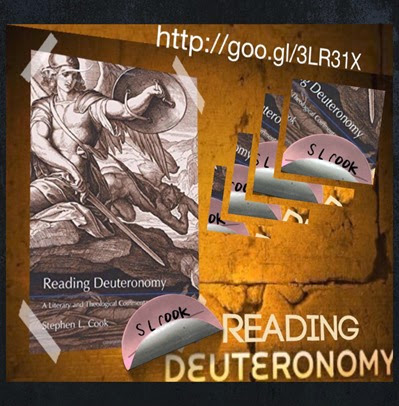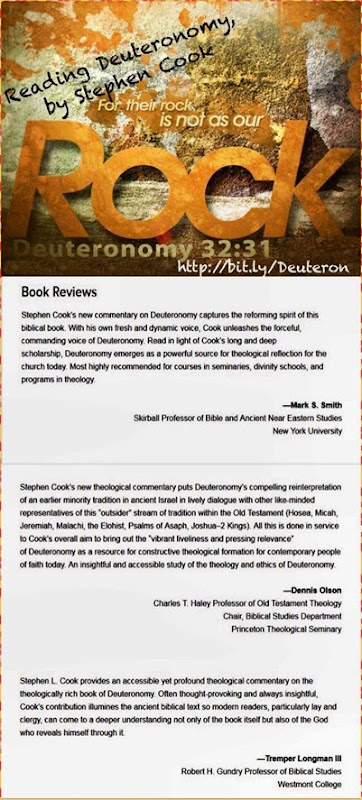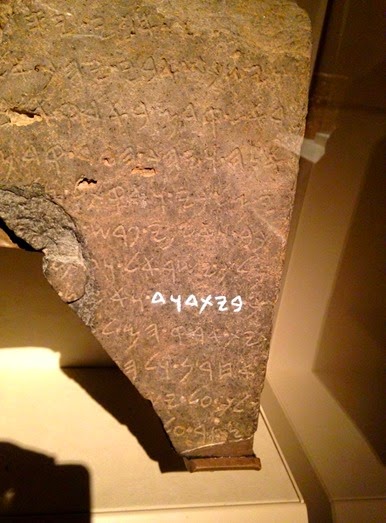
A priest friend asked me what I knew about the new book by Brown University’s Michael Satlow, How the Bible Became Holy. From his description of the book’s contents, apparently Satlow would do well to read Brevard Childs’ work, which demonstrates how the canonical process is already deeply imbedded in Bible itself, and cannot be taken as a late, politically motivated enshrinement. Here is an excerpt from an incisive review of Satlow by Sarah Ruden in the Wall Street Journal (July 11, 2014):
Satlow, an accomplished professor of Judaic studies at Brown University, presents the essentials of this progress—in both its Jewish and Christian manifestations—with impressive erudition, but he often falls short by not taking the Bible seriously enough, leaving the main conundrum untouched. The Bible's growth in authority was slow indeed, but there the Western world was anyway, by not-so-late antiquity, with a Bible of lofty and exquisite authority. Could it be that the texts were "living," in the sense that they vindicated themselves in many hard and unexpected circumstances?
Mr. Satlow often uses the word "fantasy" as a brush-off for idealistic-looking passages in scripture, as if his story were about naïve efforts to create a perfect world by means of a book. The real story is practically the opposite. It is true, for instance, that Deuteronomy never became a constitution per se; but it put forward the idea of accountable government at a time of god-kingships. That human overreach might be checked by transcendent law must have intrigued both ordinary people and an elite who came to realize that it was in no position to thunder and threaten and terrify. Through the text, then, a new way of thinking about law and society was developed and valued.
"Prophecy" and "oracle" are also for Mr. Satlow dismissive terms, suggesting magic and mumbo-jumbo. But such an attitude discounts the most important functions of the written word for the ancients. Writing that was held sacred was never properly about throwing the bones to predict the future for the gullible. In any particular case, someone at first merely emitted words in a world full of chatter. Rhetoric, narrative, poetry and ritual utterance were the communications technology of Mediterranean lands, with the effusions of individuals playing the role of so many websites and Twitter feeds. But over time, with both popular and hierarchical affirmation, some words were set in the category of truth, as plausibly connected to the eternal. It was the seconding of words' meaning through collective and long-term experience that mattered.
The operative paradox that Mr. Satlow misses is that of popularity and adaptability. No words were more self-consciously and thunderously "holy" than the curses inscribed on pharaohs' tombs as warnings, but these must merely have entertained the robbers who sacked every funerary hoard they could find. What's at issue isn't a writer's intention that a text be holy, or any authority's treatment of it as holy, but the broad assent that the text can win for its holiness.
To argue, in effect, against this process requires some questionable moves on Mr. Satlow's part. He tries to undercut, for instance, the well-founded consensus that Paul was a Diaspora Jew, from a family established in Tarsus (in modern-day Turkey), who first lived in Jerusalem during his youth or young adulthood for study and professional and religious development. For this account Mr. Satlow substitutes a speculative one of Paul as a cradle Palestinian Jew, and he does this seemingly in order to support a widespread characterization of the evangelist as a traitor to his heritage: As far as scripture is concerned, Paul hawked a debased version among people he didn't know and who themselves didn't know any better; he wasn't one of them, attuned to their needs and aspirations; holy writing as he presented it and remade it thus has no deep integrity.
Whatever the biographical reality here, Mr. Satlow certainly does not succeed in sweeping away the data indicating a more critical reality, one that broadly informed the Bible's development. Two things easily co-existed in Paul's thought and contributed jointly to his success: his great dependence on and devotion to existing scripture (from whichever geographical or cultural sources he got them, he snows down quotations, citations, glosses); and a belief that existing scripture profoundly belonged to him, so that he should be able to do as he liked with it.
Scholars like Elaine Pagels, seconding the historical critics who arose more than two centuries ago, have stressed the arbitrariness of scriptural authority. This authority is supposed to result from the facts of history, especially political and institutional facts. We are purportedly assigned certain beliefs—backed up by writings—that are useful to the powerful, and what appeals to us makes little difference. Mr. Satlow's "How the Bible Became Holy" makes me wonder whether we're entering a sort of deconstructionist era of writing about the Bible. No longer is the authority of scripture said to be artificial or illegitimate; it is said never to have existed in the first place. Of course, that's annoying to the religious; but in the general forum of ideas, it's annoying because it can't conceivably be true.









